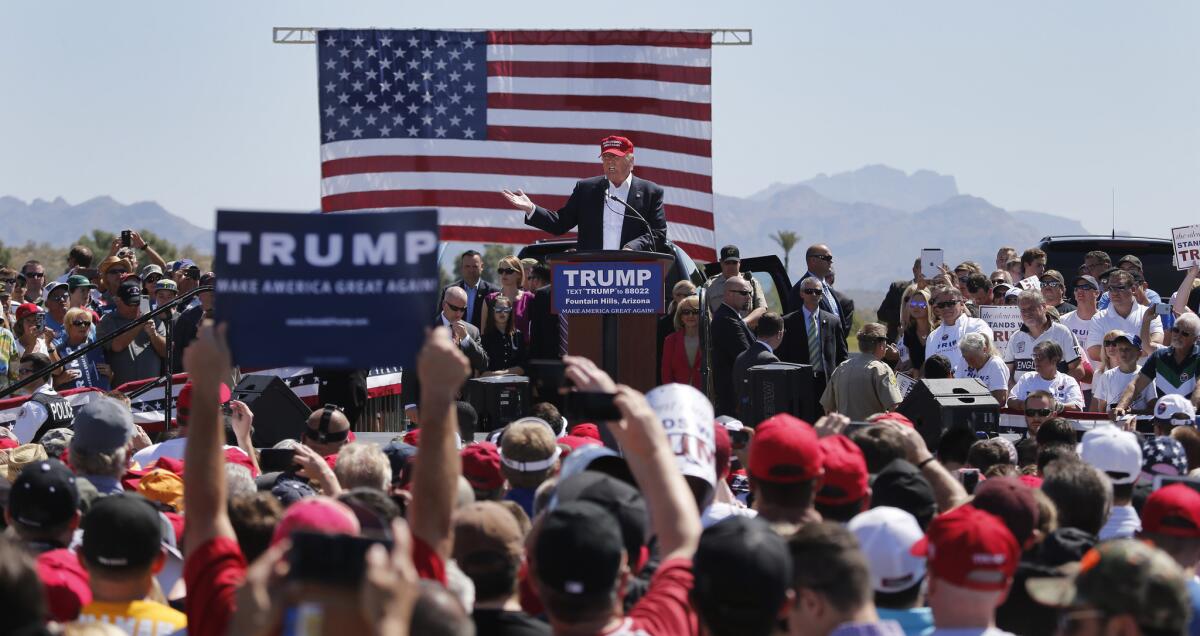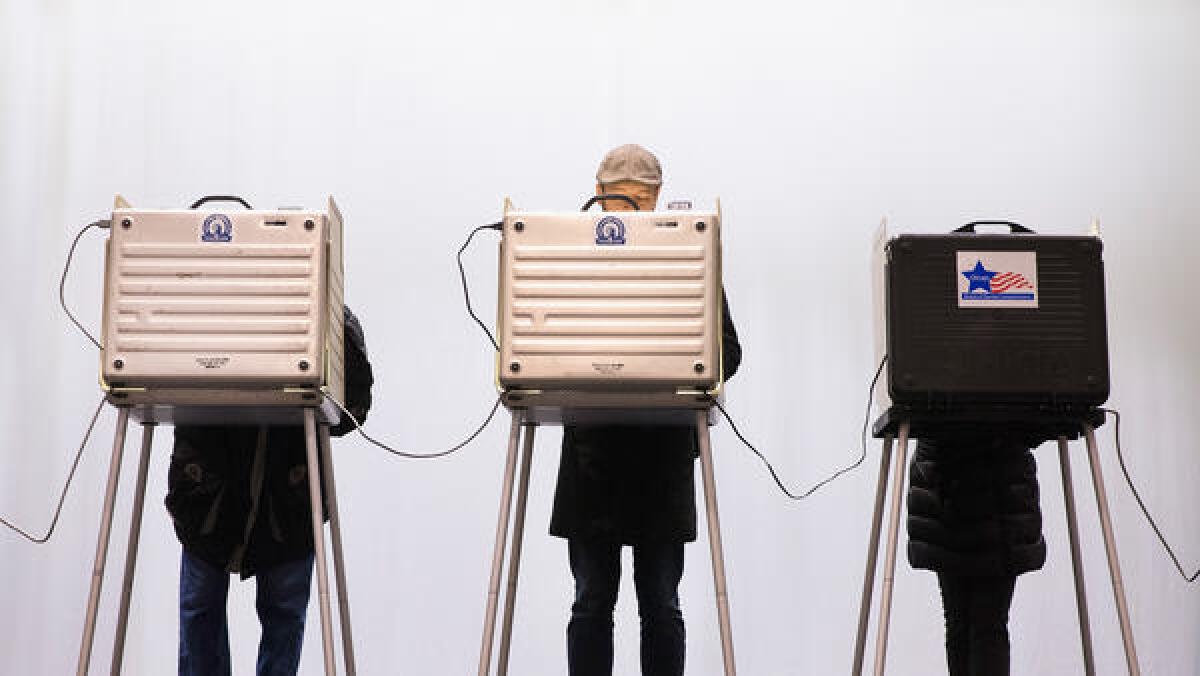Donald Trump and Ted Cruz are fighting for supremacy Tuesday in Arizona and Utah.
Clinton and Sanders headed to California this week
And so it begins.
Democratic presidential candidates Bernie Sanders and Hillary Clinton are heading to California this week, their first appearances here since it became clear that their contest probably would still be going on when the state votes on June 7.
Sanders, a senator from Vermont, announced Sunday that he would hold an 8 p.m. rally in San Diego on Tuesday, shortly after the polls close in the Arizona primary and while caucuses are underway in Utah.
Clinton, the former secretary of State, arrives the next day for a two-day visit in California, a state where she and her husband, former President Clinton, have long, deep ties. Sheâs fundraising in the Bay Area on Wednesday and in Santa Monica and Los Angeles on Thursday, though her campaign has not announced any public events.
The Democratic battle this year between Clinton and Sanders will almost certainly be contested in California. But because of the partyâs nominating rules -- the proportional allotment of delegates coupled with Clintonâs edge among so-called superdelegates who are not bound by voting results -- Sanders will have a hard time winning enough of the Democratic vote to catch up to his partyâs front-runner.
McManus: How Donald Trump is the candidate of hope and change
I was in Florida last week, attending Donald Trump rallies and talking with the voters who love him. My question was straightforward: Whatâs the secret of the front-runnerâs appeal?
Yes, Trump is attractive to voters who are angry â angry about the economy, illegal immigration and âpolitical correctness.â And some of his supporters feel threatened by racial diversity, to put it mildly. But thatâs only part of the answer.
What Trumpâs supporters also hear from their champion is a message of unbridled optimism â a promise that he can repair the economy, bring jobs back and Make America Great Again.
Trump is running as a candidate of Hope and Change.
Just listen.
Another fight erupts at a Trump rally
Another Donald Trump campaign event erupted in violence on Saturday when a protester at a Tucson rally was beaten and kicked by an audience member.
The man, identified as Bryan Sanders, was wearing an American flag shirt and carrying a picture of Trumpâs face superimposed with the Confederate battle flag. A video of the attack shows an audience member ripping the sign out of his hand and following up with a flurry of kicks and punches before being pulled away.
The suspect was identified as Tony Pettway, 32. He was arrested on a misdemeanor assault charge, according to reports. Unlike other Trump supporters who have been involved in violence at Trump rallies, the video shows the apparent Trump supporter who punched Sanders is black.
In prior rallies, Trump has encouraged physical confrontations, telling crowds that he would like to punch protesters and expressing nostalgia for âthe good old daysâ when protesters would be âcarried out on a stretcher.â
âI was protesting Trumpâs facism, his racism, his lies and his women-hating,â Sanders said in a video interview after the event, saying he was an independent who had just attended a Bernie Sanders rally.
âYou have this which is facism and an angry mob,â he said. âWeâre going to stop this. Itâs not going to continue. If it takes someone being punched in the face, no problem.â
Before the event, other protesters blocked a Tucson highway for hours, saying they were trying to stop the rally from taking place. Also Saturday, video surfaced showing Trump campaign manager Corey Lewandowski grabbing at the collar of a young protester in Tucson.
On Sunday morning, the chairman of the Republican National Committee said that he didnât think the violence at Trumpâs events was tarring the image of the party.
âItâs certainly not something that we would condone, as far as the continuation of violence, and it goes for both sides,â chairman Reince Priebus said on CNN.
Donald Trump focuses on âLyinâ Tedâ in Utah

The advertisement was used in Iowa against Sen. Ted Cruz and now Donald Trump is bringing it back with a twist to note a new nickname heâs bequeathed on his chief rival: âLyinâ Ted.â
The 30-second spot, a truncated version of an ad that ran ahead of Iowaâs caucuses, is airing in Utah in the days before Tuesdayâs contest and it castigates Cruz on immigration reform, according to Trumpâs campaign.
Trump has often said Cruz supported âamnestyâ because of an amendment he offered to the 2013 immigration bill that ultimately failed in Congress. The amendment would have stripped a provision from the bill granting a path toward citizenship, yet would have left in place one that granted legal status for those in the U.S. illegally. Cruz has stressed the amendment was nothing more than a âpoison pillâ to spike the legislation.
In Utah, Cruz is waging a serious effort to win the state and on Friday secured the support of Mitt Romney, the partyâs 2012 nominee, who is a widely popular resident of the state.
Trumpâs campaign is doling out nearly around $160,000 on the television ad in Utah, which along with Arizona will hold GOP contests Tuesday.
Trump has consistently offered unflattering nicknames to his rivals, including âLittle Marco,â for Sen. Marco Rubio of Florida, and he relentlessly labeled former Florida Gov. Jeb Bush as âlow-energy.â
When Romney announced his endorsement of Cruz on Friday, Trump used social media â as he often does â to assail Cruz.
Lopez: A taste of the Trump circus thatâs coming to California
Nohl Rosen was ready to back up the police if trouble broke out at the Donald Trump rally Saturday morning in suburban Phoenix. The computer repairman wore a flag bandanna and a âPolice Lives Matterâ T-shirt, and strapped to his right leg was a 9mm Smith & Wesson.
In California, I told him, we canât walk around with firearms holstered to our limbs.
âYouâve got a lot of problems too,â Rosen said. âI think if you loosened the gun laws like we have here, things would probably be a lot better.â
Iâm not so sure about that.
How Hillary Clintonâs campaign has learned to fix mistakes more quickly than her 2008 team
When Hillary Clinton praised Nancy Reaganâs response to AIDS shortly before Reaganâs funeral, Dominic Lowellâs phone blew up.
The day had started well for Lowell, the Clinton campaignâs director of outreach to the gay community. His boss, campaign manager Robby Mook, the first openly gay man to run a major presidential campaign, had just spoken to the Human Rights Campaign, the countryâs largest gay rights organization, to announce a big fundraiser and fire up an audience of activists.
Then, news broke that Clinton had commended the former first lady for her âlow-key advocacyâ on fighting AIDS, and Lowell and the rest of the campaign were plunged into controversy.
For many gay men and women who remember the Reagan administration as a time of tragic indifference to a growing and deadly plague, those comments provoked old feelings of anger and frustration.
The reaction threatened to swamp Clintonâs campaign just as she was beginning to look past Sen. Bernie Sanders, her rival for the Democratic nomination, and toward a potential general election battle with Republican front-runner Donald Trump.
The story of how the Clinton camp responded offers insights into an episode that served as a stress test for an operation that has proved far more successful than Clintonâs last presidential bid in 2008. The effort demonstrated both the campaignâs ability to react quickly as well as the value of her deep ties with key parts of the Democratic base.
Donald Trump could have California Democrats breathing easier
If Donald Trump or Ted Cruz is at the top of the ticket for the Republican Party come November, Rep. Pete Aguilar (D-Redlands) can take a bit of a breather.
A new analysis by the nonpartisan Cook Political Report, which handicaps U.S. House races, shows seats held by Aguilar, Rep. Jim Costa (D-Fresno) and Rep. Raul Ruiz (D-Palm Desert) were upgraded from âlikelyâ to âsolidâ Democratic seats, thanks to their heavy Latino population.
Dear Mr. Trump: My immigrant parents arenât rapists or drug dealers

Students share stories about their immigrant parents.
When Republican presidential front-runner Donald Trump says something incendiary about immigrants, itâs personal for their children.
The coalition of black, Latino and Muslim student activists that shut down a Trump rally night at the University of Illinois at Chicago is a sign of a growing national emotional reaction, said Cristina Jimenez, managing director of the immigrant youth-led advocacy group United We Dream.
Their campaigns may be over, but you can still vote for them in California

When California Republicans cast their votes in the June 7 primary, an election that could decide the GOPâs presidential nominee, theyâll probably be confronted by the ghosts of candidates past.
That means Republicans could still cast a vote for former Florida Gov. Jeb Bush, retired neurosurgeon Ben Carson, New Jersey Gov. Chris Christie, former Hewlett-Packard Chief Executive Carly Fiorina, former Virginia Gov. Jim Gilmore or Florida Sen. Marco Rubio, even though they all have ended their campaigns.
Protesters disrupt Trump as he tries to rally Arizona Republicans on immigration
Donald Trump struck a combative posture on illegal immigration amid vigorous protests Saturday as he sought to rally Arizona Republicans three days before the stateâs winner-take-all presidential primary.
More than 100 protesters blocked the main road leading to Trumpâs rally in this Phoenix suburb, chanting that he was a racist.
âGet this clown out of my town!â they shouted, carrying signs that read, among other things, âTrump = Hitlerâ and âCombat white supremacy.â